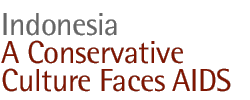Living with HIV (2005)*: 170,000 (0.1% pop.)
Receiving Drugs (2005): 3,000-4,000 (30% of those who need them)
Est. AIDS Deaths (2005): 5,500

Indonesia is confronting a rapidly worsening HIV epidemic among its large populations of drug injectors and commercial sex workers. Experts fear it's "just a matter of time" before the disease spreads further in this country of 242 million, and reaches even the most remote of the archipelago's 13,000 inhabited islands.
Already one-third of the country's drug injectors have HIV, and in the capital city of Jakarta nearly half of the injection drug users are infected. Despite the religious conservatism of this predominantly Muslim country, drug abuse is on the rise and commercial sex is widespread -- an estimated 10 million men visit sex workers every year.
While the strict code of morality doesn't stop people from engaging in these behaviors, it does play a role in preventing Indonesians from adopting safer practices that could halt the transmission of HIV. Most drug injectors know where to get sterile needles, say researchers, yet 88 percent still use non-sterile equipment because they fear that if they are caught in possession of needles, the police will view that as indication of IV drug abuse, a serious criminal offence in Indonesia.
Similarly, 85 percent of the country's sex workers reported that they had not used a condom with any client in the previous week, in part because the police still arrest women for being in possession of a condom, which they view as proof of prostitution. If Indonesia can't control the growing epidemic among these groups, experts argue that it may need to change its conservative stance.
The good news, says Peter Piot, executive director of UNAIDS, is that in Indonesia, "the opportunities are enormous to really stop the epidemic, to nip it in the bud." Already the Indonesian government provides antiretroviral drugs at no cost to anyone who needs them and "aggressive" AIDS training for health care workers. Yet there are still barriers to treatment. Fear and discrimination against those who have the disease lingers, even among health care workers. And ever since the massive decentralization of government following the corrupt regime of General Suharto, the country's former dictator, the provinces are responsible for most public services, including health care. But in poorer provinces, where government struggles to provide basic health care and education, HIV treatment and prevention isn't a top priority.
However, there is cause for hope. In 2005, the remote province of Papau, where 1 percent of the population is already infected with HIV, passed a law that fines clients of commercial sex workers up to $500 for refusing to wear a condom. The local health department has begun giving sex workers monthly check-ups and requires that those who test positive for a sexually transmitted disease must stop working until they are given a clean bill of health.
* Note: Figures reflect most recent statistics from UNAIDS and the World Health Organization.
